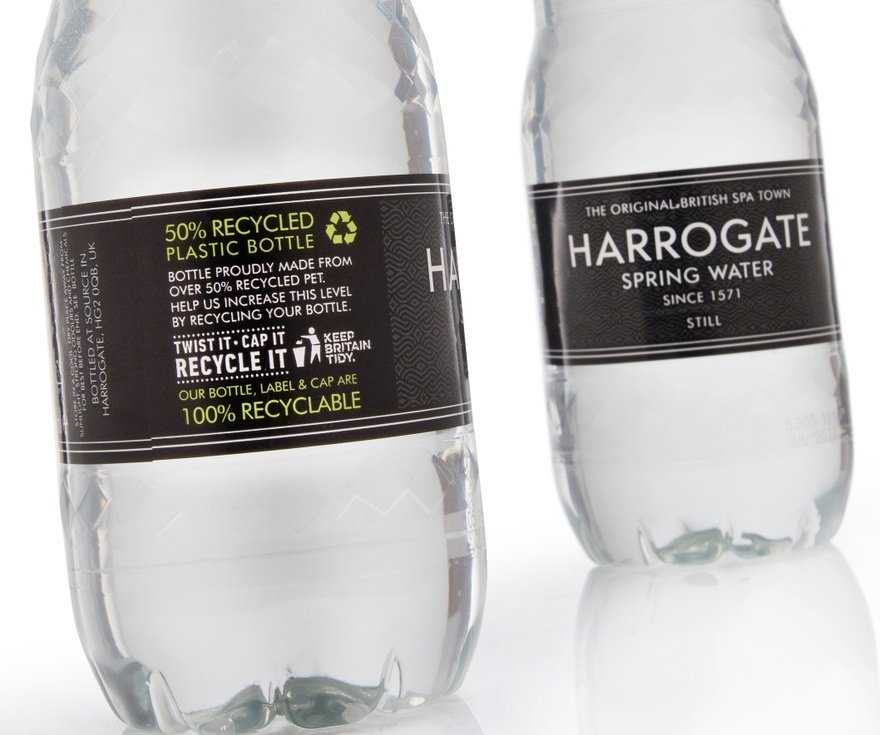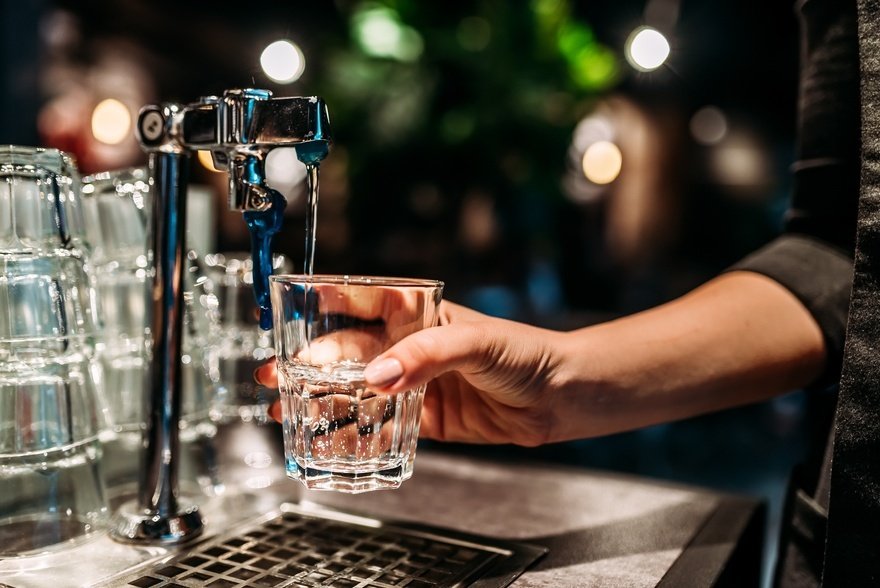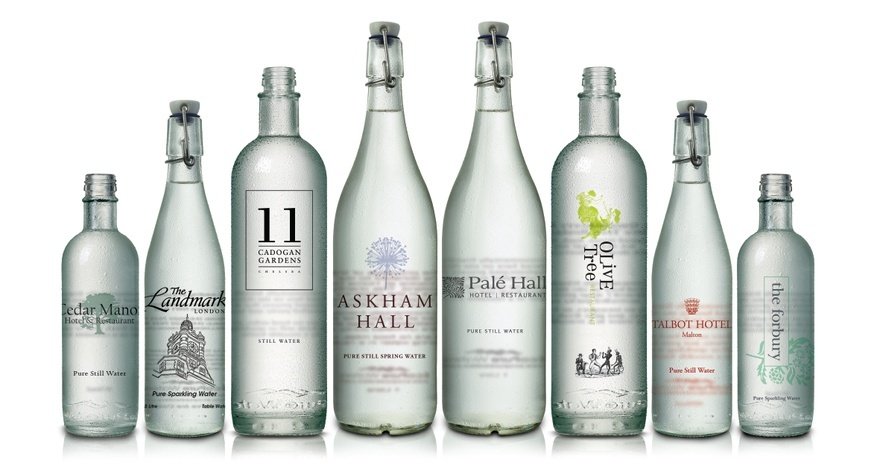Plastic remains an issue for environmentally conscious consumers, but it should still be considered an option in the bottled water sector, alongside glass and aluminium, as well as on-site filtration systems. Anne Bruce explains
The top concern for most consumers when it comes to drinking water is single-use plastic. For the operator, this rejection of plastic moved the goalposts on bottled water. The choice of what to stock is no longer just a commercial decision; more than ever there needs to be a sustainability argument to make to customers.
But data shows that water sales are actually rising. Bottled water sales were up 6.1% year-on-year in 2018 to 2.98 billion litres and now have their biggest ever market share of soft drinks, up to 21.8% from 20.2% in 2017, according to the British Soft Drinks Association (BSDA)/Global Data.
So, how do operators cash in on a growing market segment with a convincing offer? Plastic fantastic The first conundrum to solve is whether to opt for plastic, glass or aluminium cans. Despite consumers' best attempts to avoid single-use plastic, 95.1% of bottled water was sold in plastic bottles in 2018, according to the BSDA report. Plastic bottles for water look set to remain ubiquitous in most foodservice channels, despite the negative media coverage.
Some suppliers say that the message that needs to be conveyed to consumers is that the main problem is not plastic, but the fact that it is treated as single-use litter. PET plastic, from which water bottles are typically made, can be easily recycled if they are disposed of properly. Improving local recycling facilities and rates should be a focus.
Harrogate Water brand manager Nicky Cain says: "A PET plastic bottle is designed to be 100% recyclable and every bottle can come back as another bottle, creating a truly circular economy. Describing a PET bottle as ‘single use' is inaccurate and misleads consumers. We should all be encouraging recycling so that bottles can be put to new uses and recycled again and again."
Harrogate water now uses 51% UK-sourced recycled PET in its plastic water bottles, she adds, and it wants to increase this percentage depending on availability of recycled materials. Over at Highland Spring Group, the plastic fight-back is also raging: "We want consumers to know that every Highland Spring bottle can be recycled and, on top of this, we're prioritising the development of intelligent, sustainable innovations in packaging," says Nichola Grant, channel marketing manager. More work needs to be done to make it possible to source recycled plastic in the quantities and quality needed, Grant says.
In the meantime, the supplier has a target of ensuring every bottle of Highland Spring natural source water is made from 50% recycled plastic by 2022.
Radnor Hills also argues that plastic is a versatile and practical material for packaging and has just installed its first aluminium canning line at its site in Wales. It says that while all of its products are fully recyclable, aluminium cans have the highest recycling rate. The new line is capable of filling still, sparkling and infused products to create 330ml cans to be sold in foodservice and retail channels.
Fill it up
As packaged water suppliers argue their case, the turn away from plastic means that suppliers of filtered mains water systems have found themselves more in demand in the restaurant and hotel sector, as refillable water appears to offer a more environmentally friendly solution. It's a development that suppliers in this area are quick to jump on, arguing that there are also numerous cost benefits and other advantages of not buying in bottled water.
Nordaq is a global filtered water brand which offers a pay-as-you-pour rental system including filters and bottles, service and maintenance. It claims to typically remove 100,000 bottles out of circulation per year for a 150-bedroom hotel.
Peter Smeaton, director of Nordaq UK, says: "Nordaq is always fresh – not months' old water bottled and shipped and stored before it reaches the customer."
He lists some of the advantages of using filtered water, including a reduced carbon footprint, and that valuable and expensive floor space used to store pallets of water is freed up. There is also significant reduction in logistical time moving water in and out, he says.
Paul Proctor, managing director of EcoPure Waters, says that investing in mains water filtration rather than buying in bottled water can also improve profitability.
It is also an opportunity to enhance your in-house branding by printing your name and logo on your reusable bottles. And Adam Lenton, marketing manager for EauVation, a manufacturer and supplier of filtered water systems, cites cost alongside sustainability in favour of filtered water. He says that establishments are serving more water and are accordingly looking for sustainable and cost-effective alternatives to bottled water. EauVation systems provide fresh, filtered, chilled or boiling, still or sparkling water at a typical cost of less than 5p per litre, compared to buying pre-bottled mineral water at a cost of more than 50p per bottle, he reports.
For supplier Zerica, plumbed-in water coolers further allow guaranteed availability of chilled, still and sparkling filtered water, day or night, with no more shopping for water, more space in the fridge and no more disposal costs.
But it's worth remembering that a restaurant's filtered water system needs filtration equipment to operate, which also needs to be recycled responsibly.
Emily Frank, marketing director at One Water, suggests that with no right answers, maybe the best approach is to move the sustainability question on. One Water comes in a range of different formats, including plastic and glass bottles and profits from the sale of each pack go towards funding clean water projects worldwide.
"We believe that, until the perfect pack format for water becomes available, the answer lies in offering consumers choice, as well as providing unbiased information on the benefits of each," she says.
Moving away from packaging and sustainability, bottled water suppliers are now focused on marketing the benefits of paying for bottled water over settling for tap. They emphasise that bottled water needs to be presented as an "added value option", to attract consumers moving across to water from other styles of soft drinks.
Natural mineral water, which made up 65% of bottled water sales in 2018, according to the BSDA, is legally defined to come from a specified ground water source, which is protected from all kinds of pollution and is untreated.
Spring water, which made up 30% of bottled water sales in 2018, is also a legal definition that allows more leeway than mineral water, for example in permitted treatments.
Cain of Harrogate Water comments that branded natural source waters are naturally safe to drink without chemical treatment: "Natural source bottled water is special and distinct from all other types of water, providing consumers with allimportant confidence through trusted provenance. Brands provide consumers with choice and guaranteed quality and consistent taste."
She argues that without the option of natural source bottled water, consumers have shown that they don't opt for tap as an alternative, but instead choose a more "unhealthy" beverage.
"Strong brand identity, providing reassurance of quality and provenance, is a strong influence on consumer choice, acting as a brake on commoditisation. If consumers are switching from other beverages, distinctive style and identity can play an important part in the switch," she says.
Grant of Highland Spring also believes that trust remains a key water purchase driver for consumers who opt for brands with a reputation for great taste and strong provenance credentials. She comments that provenance is a particularly interesting factor in the sparkling water sector, which is seeing a boom in popularity, data suggests. It is worth £147.9m in the out-of-home market and growing at 6.2% (CGA MAT 31.07.19).
Grant says: "As no- and low-alcohol serves continue to increase in popularity out of home, now more than ever consumers expect the same experience when choosing an alternative to an alcoholic beverage. As such, we believe that using sparkling water instead of soda or other mixers is an untapped opportunity – it is the only mixer with no calories, no sugar, no preservatives and no additives."
That there is an untapped area in a sector as mature as water is certainly good news for operators, and that water sales are on the up is also a positive. However, that does not mean that it's time to sit back and relax. Market growth and shifting trends mean that your water offer and marketing messages as well as sustainability credentials need to be kept under review. The water offer is one that needs to be managed with a firm grasp.
Suppliers
- EauVation www.eauvation.co.uk
- EcoPure Waters www.ecopurewaters.com
- Harrogate Spring www.harrogatespring.com
- Highland Spring Group www.highlandspringgroup.com
- One Water www.onedifference.org
- Nordaq www.nordaq.com
- Radnor Hills www.radnorhills.co.uk
- Zerica www.zerica.com
Continue reading
You need to create an account to read this article. It's free and only requires a few basic details.
Already subscribed? Log In












